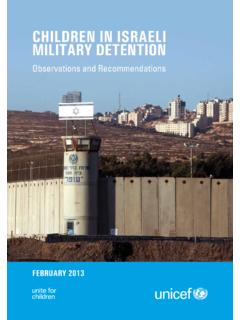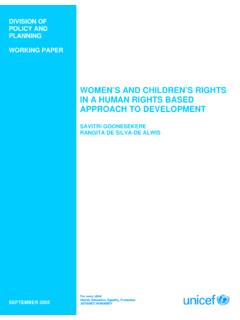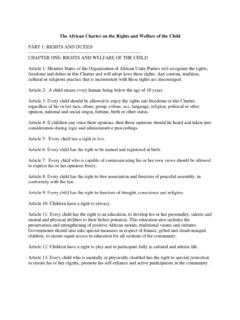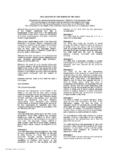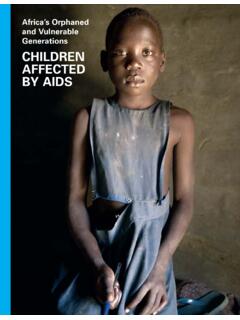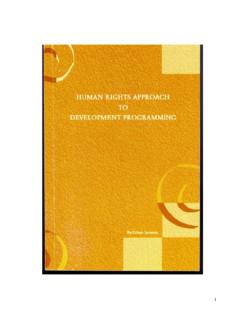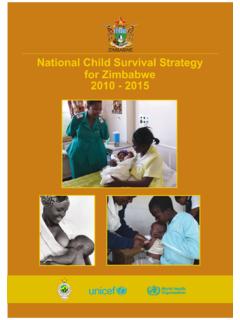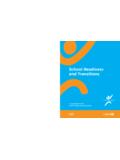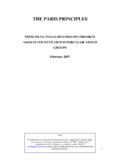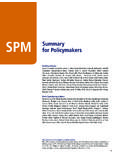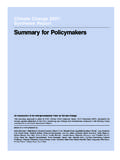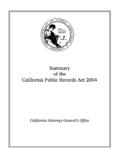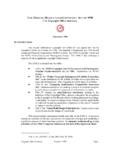Transcription of FACT SHEET: A summary of the rights under the …
1 FACT SHEET: a summary of the rights under the convention on the rights of the child Article 1 (Definition of the child ): The convention defines a ' child ' as a person below the age of 18, unless the laws of a particular country set the legal age for adulthood younger. The Committee on the rights of the child , the monitoring body for the convention , has encouraged States to review the age of majority if it is set below 18 and to increase the level of protection for all children under 18. Article 2 (Non-discrimination): The convention applies to all children, whatever their race, religion or abilities; whatever they think or say, whatever type of family they come from. It doesn't matter where children live, what language they speak, what their parents do, whether they are boys or girls, what their culture is, whether they have a disability or whether they are rich or poor. No child should be treated unfairly on any basis. Article 3 (Best interests of the child ): The best interests of children must be the primary concern in making decisions that may affect them.
2 All adults should do what is best for children. When adults make decisions, they should think about how their decisions will affect children. This particularly applies to budget, policy and law makers. Article 4 (Protection of rights ): Governments have a responsibility to take all available measures to make sure children's rights are respected, protected and fulfilled. When countries ratify the convention , they agree to review their laws relating to children. This involves assessing their social services, legal, health and educational systems, as well as levels of funding for these services. Governments are then obliged to take all necessary steps to ensure that the minimum standards set by the convention in these areas are being met. They must help families protect children's rights and create an environment where they can grow and reach their potential. In some instances, this may involve changing existing laws or creating new ones. Such legislative changes are not imposed, but come about through the same process by which any law is created or reformed within a country.
3 Article 41 of the convention points out the when a country already has higher legal standards than those seen in the convention , the higher standards always prevail. Article 5 (Parental guidance): Governments should respect the rights and responsibilities of families to direct and guide their children so that, as they grow, they learn to use their rights properly. Helping children to understand their rights does not mean pushing them to make choices with consequences that they are too young to handle. Article 5 encourages parents to deal with rights issues "in a manner consistent with the evolving capacities of the child ". The convention does not take responsibility for children away from their parents and give more authority to governments. It does place on governments the responsibility to protect and assist families in fulfilling their essential role as nurturers of children. Article 6 (Survival and development): Children have the right to live. Governments should ensure that children survive and develop healthily.
4 Article 7 (Registration, name, nationality, care): All children have the right to a legally registered name, officially recognised by the government. Children have the right to a nationality (to belong to a country). Children also have the right to know and, as far as possible, to be cared for by their parents. Article 8 (Preservation of identity): Children have the right to an identity an official record of who they are. Governments should respect children's right to a name, a nationality and family ties. Article 9 (Separation from parents): Children have the right to live with their parent(s), unless it is bad for them. Children whose parents do not live together have the right to stay in contact with both parents, unless this might hurt the child . Article 10 (Family reunification): Families whose members live in different countries should be allowed to move between those countries so that parents and children can stay in contact, or get back together as a family.
5 For every child Health, Education, Equality, Protection ADVANCE HUMANITY. Article 11 (Kidnapping): Governments should take steps to stop children being taken out of their own country illegally. This article is particularly concerned with parental abductions. The convention 's Optional Protocol on the sale of children, child prostitution and child pornography has a provision that concerns abduction for financial gain. Article 12 (Respect for the views of the child ): When adults are making decisions that affect children, children have the right to say what they think should happen and have their opinions taken into account. This does not mean that children can now tell their parents what to do. This convention encourages adults to listen to the opinions of children and involve them in decision-making -- not give children authority over adults. Article 12 does not interfere with parents' right and responsibility to express their views on matters affecting their children.
6 Moreover, the convention recognizes that the level of a child 's participation in decisions must be appropriate to the child 's level of maturity. Children's ability to form and express their opinions develops with age and most adults will naturally give the views of teenagers greater weight than those of a preschooler, whether in family, legal or administrative decisions. Article 12 (Respect for the views of the child ): When adults are making decisions that affect children, children have the right to say what they think should happen and have their opinions taken into account. Article 13 (Freedom of expression): Children have the right to get and share information, as long as the information is not damaging to them or others. In exercising the right to freedom of expression, children have the responsibility to also respect the rights , freedoms and reputations of others. The freedom of expression includes the right to share information in any way they choose, including by talking, drawing or writing.
7 Article 14 (Freedom of thought, conscience and religion): Children have the right to think and believe what they want and to practise their religion, as long as they are not stopping other people from enjoying their rights . Parents should help guide their children in these matters. The convention respects the rights and duties of parents in providing religious and moral guidance to their children. Religious groups around the world have expressed support for the convention , which indicates that it in no way prevents parents from bringing their children up within a religious tradition. At the same time, the convention recognizes that as children mature and are able to form their own views, some may question certain religious practices or cultural traditions. The convention supports children's right to examine their beliefs, but it also states that their right to express their beliefs implies respect for the rights and freedoms of others. Article 15 (Freedom of association): Children have the right to meet together and to join groups and organisations, as long as it does not stop other people from enjoying their rights .
8 In exercising their rights , children have the responsibility to respect the rights , freedoms and reputations of others. Article 16 (Right to privacy): Children have a right to privacy. The law should protect them from attacks against their way of life, their good name, their families and their homes. Article 17 (Access to information; mass media): Children have the right to get information that is important to their health and well-being. Governments should encourage mass media radio, television, newspapers and Internet content sources to provide information that children can understand and to not promote materials that could harm children. Mass media should particularly be encouraged to supply information in languages that minority and indigenous children can understand. Children should also have access to children's books. Article 18 (Parental responsibilities; state assistance): Both parents share responsibility for bringing up their children, and should always consider what is best for each child .
9 Governments must respect the responsibility of parents for providing appropriate guidance to their children the convention does not take responsibility for children away from their parents and give more authority to governments. It places a responsibility on governments to provide support services to parents, especially if both parents work outside the home. Article 19 (Protection from all forms of violence): Children have the right to be protected from being hurt and mistreated, physically or mentally. Governments should ensure that children are properly cared for and protect them from violence, abuse and neglect by their parents, or anyone else who looks after For every child Health, Education, Equality, Protection ADVANCE HUMANITY. them. In terms of discipline, the convention does not specify what forms of punishment parents should use. However any form of discipline involving violence is unacceptable. There are ways to discipline children that are effective in helping children learn about family and social expectations for their behaviour ones that are non-violent, are appropriate to the child 's level of development and take the best interests of the child into consideration.
10 In most countries, laws already define what sorts of punishments are considered excessive or abusive. It is up to each government to review these laws in light of the convention . Article 20 (Children deprived of family environment): Children who cannot be looked after by their own family have a right to special care and must be looked after properly, by people who respect their ethnic group, religion, culture and language. Article 21 (Adoption): Children have the right to care and protection if they are adopted or in foster care. The first concern must be what is best for them. The same rules should apply whether they are adopted in the country where they were born, or if they are taken to live in another country. Article 22 (Refugee children): Children have the right to special protection and help if they are refugees (if they have been forced to leave their home and live in another country), as well as all the rights in this convention . Article 23 (Children with disabilities): Children who have any kind of disability have the right to special care and support, as well as all the rights in the convention , so that they can live full and independent lives.
